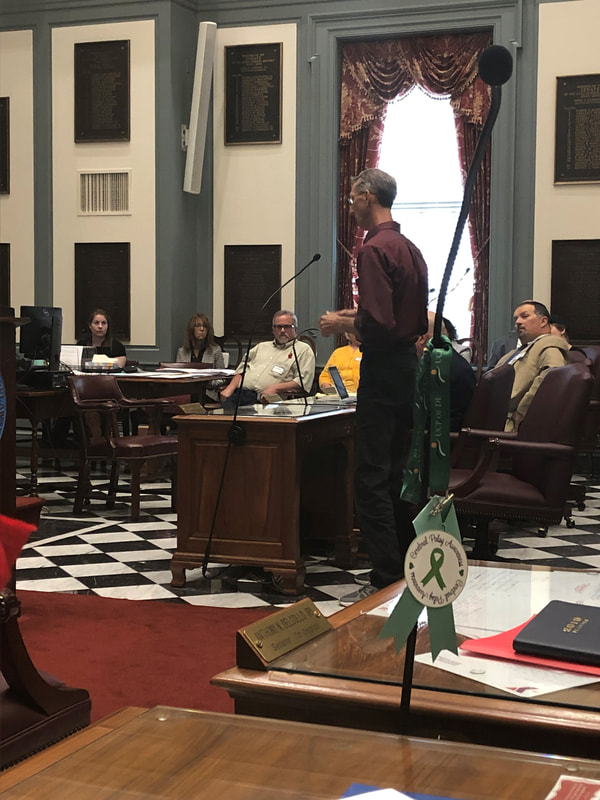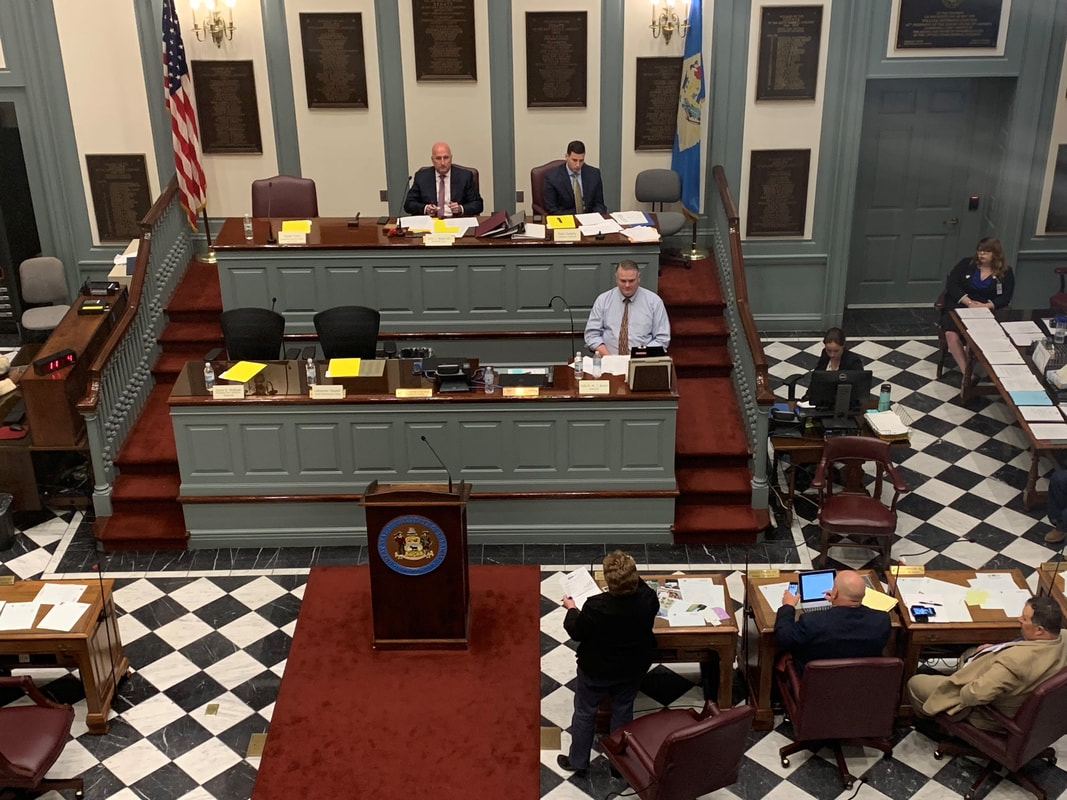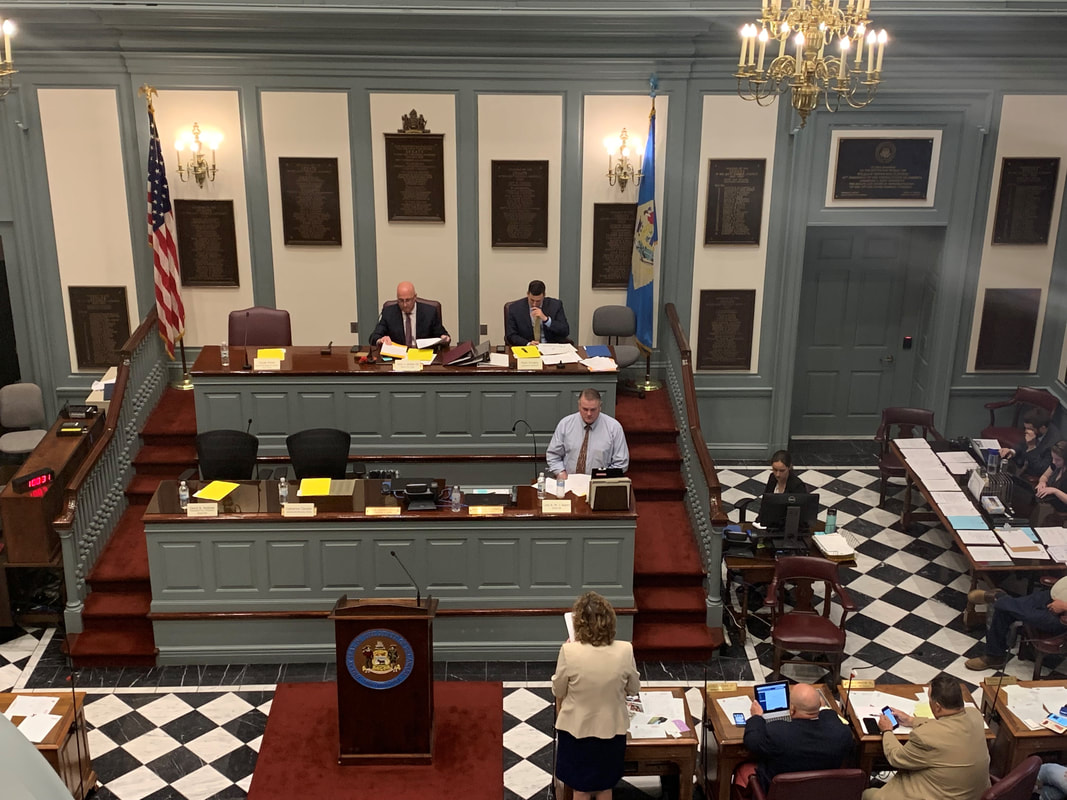|
by James DeChene
Last week had, and in the upcoming magazine will have, a write up on the end of session that wrapped up early July 1st. Not captured, however, were some of the more esoteric moments that helped make up the last six months that I’ve found interesting now that summer has officially begun and your friendly neighborhood government affairs professional has time to think. Headed into January with over 20% new faces was both exciting, thrilling, nerve-wracking and (at least for me) a career first to work with so many new members. It’s been interesting watching them learn the ways of the building, finding out what issues they are passionate about, and how the State Chamber and our members fit in. The answer to the last point is a positive one from my perspective. Each of the freshman legislators I had the opportunity to work with were open to hearing how legislation would impact the business community, and while we may not have agreed after each conversation, it’s important to continue to build the dialogue and relationship going forward. I was also impressed with the “temperature” of the building. It’s no secret the last few years ended in with tempers flaring as the time grew later and later into July 1st, and even beyond. This year (with hopes that next year will be similar) each Chamber was efficient in finishing up what they needed to do, and it was one of the earliest, and least contentious, endings to a session in recent memory. Let’s keep that particular streak going. As I think back to the work that was accomplished in the last six months, I’m grateful for the partnerships that helped make it possible. The Association of Chambers has been the most active it’s been in years with almost every chamber of commerce actively participating. The State Chamber membership stepped up to help provide background, talking points, suggestions, communications and alternatives on key pieces of legislation this year. That streak will definitely need to keep going. You’ll hear more from us in the coming months on priorities we’re pursuing, including cheaper health care options for businesses, innovative ideas on workforce development and training opportunities, as well as asks for help to keep up the pressure on the “old standbys” in minimum wage and marijuana legalization legislation. You’ll also be asked to provide your feedback on these and other issues as we shape our 2020 agenda. Until then, I hope you enjoy this bit of summer and that your AC continues to work.
0 Comments
Earlier this morning the General Assembly finished their work for the first leg of this legislative session. Items of note included a budget that set aside close to $125 million in reserves for future years, the largest bond bill in Delaware history, and a grant-in-aid bill with more money allocated than in recent years.
Of specific note for the business community are the bills that did not find their way to passage, although many will return in January. They include a minimum wage increase, a tipped worker minimum wage increase, and the legalization of recreational marijuana. The Chamber continues work on a number of items into next year, including finding creative ways to lower health care premiums for small and medium sized businesses, investments in workforce development and training opportunities for unemployed and underemployed workers, and finding innovative ways to attract and retain high level talent for employers looking to expand and relocate here in Delaware. The State Chamber thanks you for your engagement this legislative session and we look forward to working with you next year in making sure Delaware is the best place to live, work and do business. by James DeChene This week, the last of this session saw a few bills of importance to the business community being either introduced or worked. One is SB 71, a bill that would mandate that all future pharmacies run in Delaware be owned and operated by a pharmacist or an entity comprised of a majority of pharmacists. This would have serious impacts on the pharmacy, developer and construction industries in Delaware, as chain pharmacies, grocery stores and stores like Walmart and Target would no longer be able to run their pharmacies themselves, and would instead have to lease out space to pharmacists/pharmacist groups if they wanted one in their store. This would have a chilling effect on future development and expansion of these entities in Delaware, including potentially putting the kibosh on the proposed Wegmans in Barley Mill. The State Chamber and others have asked for the bill to be delayed until next year so that we can work toward a compromise. More to come. Two bills involving tipped workers and minimum wage were introduced this week. One would raise the tipped worker minimum wage to 65% of the current minimum wage, and the other would govern how tips are reported and paid out by an employer. The State Chamber is currently reviewing these bills with industry organizations and representatives to judge their impact. The Senate passed the Bond bill late Thursday night, totalling $816MM for FY19 and $862.9MM for FY20, where it now faces a vote in the House. The General Assembly will meet on Sunday and into Monday as they finalize the last minute spending bills (bond and grant in aid) and work to get their last minute must-haves passed. Look for an update Monday on the big ticket items accomplished. by James DeChene
This week in Dover saw the General Assembly continuing their work prior to the June 30th recess. Items of note included confirmation that the minimum wage bill will not be worked on again until January, and the same for the legalization of marijuana. The State Chamber will continue to advocate on behalf of the business community educating members of the General Assembly of the pitfalls of these bills, and will be looking to our members to help share their stories. The House passed the budget bill this week, along with an approximate $61 million one-time spending bill to be administered by the Office of Management and Budget. Once bond and grants in aid bills are finalized, that will dictate how much will be used in the set aside for reserves (a reminder that the State Chamber has called for $125 million to be set aside). A bill that would allow school districts to provide students with bus passes, allowing them to get to school and potentially to after school jobs, passed the Senate where it now heads to the House. A bill that would increase the penalties for failure to file their proof of unemployment insurance each quarter from $17.25 to a minimum of $100 with a cap of $450. Next week is the final week of session, ending June 30/July 1. Items to be considered, along with finalizing the budget, will be bond bill, grants in aid, and perhaps the workplace fraud act legislation that the Chamber and others have been working on for about a year now. More to come. by James DeChene This week in Dover the major bill impacting the business community was SB105, which will raise Delaware’s minimum wage to $15. We started off the week hosting a teletown hall with over 50 members joining to hear the latest on timing and strategies, and a number of businesses joined us in Dover to make comment on the bill at the Senate Labor Committee. The stories business leaders shared during the committee meeting were compelling and varied, and included entities ranging from nonprofits to small and medium sized businesses from bakeries to a small business sign maker. Ultimately the bill was released from committee and has now been assigned to Senate Finance Committee due the bill’s significant fiscal note. If you have not taken the opportunity to contact your senator on this bill, I urge you to do so by visiting our Action Network page. Other bills of note: The passage of a Chamber-backed bill in SB61, which would create a Transportation Infrastructure Investment Fund (TIFF) to help expedite commercial and industrial development projects. Released out of committee was SB74. This bill would make a technical change to the New Economy Jobs credit making it easier and more likely businesses will be able to take advantage of the credit. Moving forward, there are 7(!) legislative days left this session. DEFAC will meet next Wednesday to announce the final forecast numbers that will dictate how much money will be allocated to the bond and grant-in-aid bills. members testifying against sb105 on june 12:
by James DeChene
This week was the first in the four-week sprint to June 30. Highlights this week included: HB110, the legalization of marijuana bill was released out of House Revenue and Finance committee. DSCC remains opposed to the bill for reasons such as restrictions in how employers can create employment policies surrounding marijuana use, the current difficulty for employers finding qualified applicants that can pass a drug screen (which we think will be exacerbated by legalization) and the lack of a spot test for impairment. SB105, the bill that would raise Delaware’s minimum wage to $11 in January 2020 and then by a dollar each year until it hits $15 in 2024 (with an imbedded escalator to raise with cost of living), was tabled in committee this week, HOWEVER, it will be heard in Senate Labor Committee next Wednesday, June 12. This will be one of the Key Votes (along with HB110) that DSCC will be using when making the decision on whether to support candidates. Also this week was the State Chamber’s End-of-Session Brunch. Attendees heard from Tim Holly, chair of the DSCC Employer Advocacy Committee, on HB110, from Gary Stockbridge, DSCC Chairman, Chair of the Delaware Workforce Development Board (DWDB) and President of Delmarva Power, on what the DWDB is up to and how members can help in workforce training. We then heard from Solomon Adote from the Delaware Department on Technology & Information on the Cyber Security Council and the work they are doing to develop best practices on how to combat cybersecurity threats. Rounding out the morning were remarks from House Speaker Pete Schwartzkopf on what to expect in June, including legislation on clean water, medical and recreational marijuana, education investments and how the state budget is shaping up. Senate President David McBride offered his perspective including acknowledging efforts by the General Assembly and the State Chamber to help provide economic development opportunities in Delaware. He also discussed what the Senate will be working on, including minimum wage in committee, education and transportation infrastructure investment by James DeChene
This week was the first of the Memorial Day break, and the first of the Joint Finance Committee working on marking up the FY20 budget. Good news for budget writers came in the form of DEFAC numbers on Monday, adding close to $80 million to the forecast. Split almost evenly between the current year ($40.7 million) and next year ($38 million), this meeting continued the trend of meetings since September where an average of $40 million to the current year was brought in. This month the largest increase came from personal income tax filings. The total increases for FY19 total $200 million and nets out to an additional $160 to spend, or as the Chamber advocates, to set a large portion aside for when the economy takes a downturn. That message was the focus of a letter sent to the members of Joint Finance this week from Chamber president Mike Quaranta that setting aside these dollars is good stewardship of public dollars. As a large part of Delaware’s revenue stream does not move with the economy, it’s important to save now while the money is coming in. More good news in that Delaware’s unemployment rate is the lowest since 1988, and we haven’t suffered the national numbers where the unemployment numbers are down, but so is workforce participation. A good win-win for Delaware. And lastly, the best news of all this week, is the three-day weekend. Memorial Day, BBQs and vacation aside, is the time when we should reflect on those who gave their lives for the lifestyle we currently enjoy. The freedoms we have today certainly weren’t free to achieve, and the thousands of men and women who made the ultimate sacrifice deserve recognition in how they helped shape this great country of ours. by James DeChene
This week saw action on bills important to the Chamber. First, SB74 provides employers taking advantage of the New Economy Jobs credit to prorate the credit over 12 months, rather than using the calendar year (Chamber supports). This would allow employers making hires at the end of the year a full 12 months to spread out the credit. SB21, creating the Transportation Infrastructure Investment Fund was released from House Transportation Committee (Chamber supports). A bill banning certain flame retardants in consumer products (HB117-Chamber opposes) was tabled in committee. A bill banning single use plastic bags (HB130) passed the House and now goes to the Governor for signature. The effective date for implementation is January 1, 2021. This session’s HB110, an act to legalize recreational marijuana, was introduced this week. As drafted the Chamber still opposes the language and will be working to insert language to protect employers. As previously noted, 71% of Chamber members oppose legalization. Last week the Chamber attended a working group focused on what the next round of renewable portfolio standard goals would be post-2025. The Chamber expressed concerns over how increasing renewables would impact Delaware commercial energy users, and to make sure that as technology continues to improve, Delaware doesn’t lock itself in to a certain type of renewable source. The General Assembly is off for the next two weeks before returning for all of June. by James DeChene
This week kicked off the first round of Joint Finance Committee Hearings. Meeting throughout February, JFC members will hear from each state government agency on what their budget needs are for the next year and what and how the programs they provide are faring. Of note this year is the Governor’s Recommended Budget setting aside 2% of revenues to be used in times of economic downturn. That roughly $90 million is added to $45 million that was set aside last year. This means there is a $135 million pot of money that will be carried forward into next year’s budget, given legislators follow the budget plan. The problem will be if legislators choose to ignore the Governor and invest that money in long-term programs requiring ongoing revenues to sustain them. The State Chamber has been bullish on supporting efforts of budget stabilization and remains committed to that effort. Also of note this week was a CNBC article on jobs at risk of automation. According to the article, automation will impact 25% of the US working population and many of the jobs that are either entry level, or slightly above, including cashiers, customer service representatives, and even commercial truck drivers. You can read Mike's President's Message for more on that and a link to the article. What this means functionally for policy makers is that focusing on legislative items like raising the minimum wage or creating other barriers to employment will only serve to hasten the demise of these jobs. Kiosks and other self-service centers will be adopted more quickly, leaving behind a displaced workforce lacking the training or skills necessary to move on to their next jobs. Instead, focus should be on providing skills training to targeted industries, so instead of being a cashier, a person can be a technician working to maintain and repair the kiosk. by James DeChene
Next Tuesday, the day after the State Chamber’s Annual Dinner (see you there), the 150th General Assembly will gavel into session, with roughly 20% new members between the House and Senate. Other changes include a new Senate Secretary (best of luck, Joy), some new staff faces, new seating charts, and new committee assignments and offices for members. Some things, though, remain the same, including the “Delaware Blue” paint scheme that the lobby core will be staring at for the next six months. For some members, Tuesday will represent the first time they will vote “Yes” or “No,” and if history holds, they will do so a few hundred times over the next two years. The variety of items facing their votes will be numerous, and based on the pre-filed legislation so far, we know of a few specifics. Two new top tax brackets for high earners, an Equal Rights Amendment that when passed will become a Delaware constitutional amendment, and changing the polling hours for school board elections. Another stack of pre-filed bills will be released today, and certainly more will come as session continues. Items to watch include legislation to legalize recreational marijuana, more changes to Delaware’s minimum wage, proposed changes to Delaware’s LLC regulations, predictive scheduling, and a host of unknown, but important, issues that will face the business community. As legislation is introduced that impacts your business we and your elected officials need to hear from you. Share with us how new proposed legislation will impact your employees or force other changes to your business; or how it could change your plans for investment, expansion, or your ability to stay in business. These stories are critical to be heard, and we will have measures in place to make it as easy as possible for you to comment without taking time away from focusing on your operations. Your voice matters and the State Chamber works to make it heard. |
Archives
July 2024
Categories
All
|
|
Copyright Delaware State Chamber of Commerce, Inc.
All Rights Reserved. PO Box 671 | Wilmington DE 19899 (302) 655-7221 | [email protected] | sitemap |
|




 RSS Feed
RSS Feed